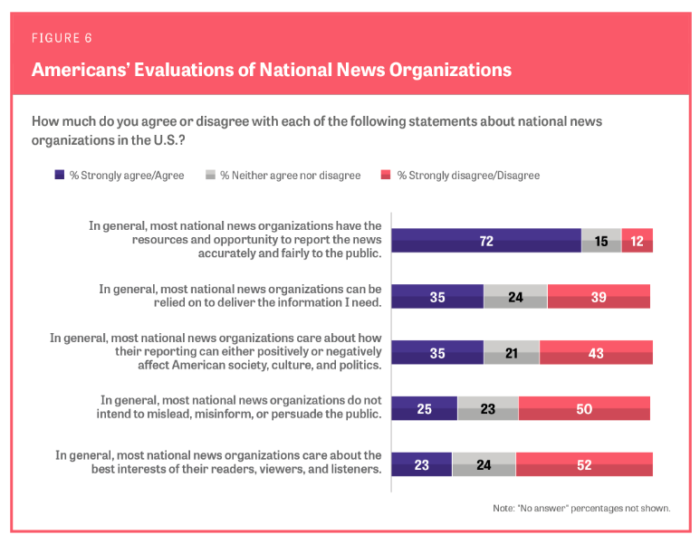Nearly three-quarters of Americans think national news orgs can report fairly and accurately, but only 35% of Americans believe they reliably do, a new study has found.
In a survey of 5,593 adults, Gallup and the Knight Foundation — which have been publishing reports on trust in news media since 2017 — found only 26% of Americans view news media favorably overall. A full 50% of respondents disagreed with the statement that most national news orgs “do not intend to mislead, misinform, or persuade the public.”

The study sidesteps valid questions about referring to “the media” in survey questions without attempting to differentiate between news sources like, say, Newsmax and The Daily Wire or Reuters and The Wall Street Journal.
As long as you define “the media” as everything from Fox and Newsmax to MSNBC what sane person would possibly say they trust it? 1/2 https://t.co/YXrfWXmTNz
— Dan Froomkin/PressWatchers.org (@froomkin) February 16, 2023
As other research has found, the Knight/Gallup study indicated Americans trust local newsrooms more than national ones. More than half of Americans said local news outlets can generally be relied on, compared to 35% who expressed the same confidence in national news orgs.

As in previous years, Gallup and Knight found Republicans and younger people were more likely to hold negative views of national news media than Democrats or older people.
This report also found negative views toward media are growing across political affiliations, with the greatest deterioration of trust occurring among political independents. (Before you assume that shift can be attributed to independents who actually lean toward one party or the other, know that Gallup/Knight found 64% of “true independents who do not lean Republican or Democrat” now view news media unfavorably, no different than the independents who did express a lean.)
Newsrooms have been trying to repair credibility and trust with readers for at least as long as Gallup/Knight have been recording the decline. In this report, Gallup/Knight acknowledged those efforts have largely been unsuccessful in stopping — never mind reversing — the downward trend.
“Many Americans say they care about transparency, objectivity and accuracy. But if many news outlets already have high journalistic standards in place, why does trust continue to diminish overall?” the report reads. “This study suggests that many Americans … feel distrust on an emotional level, believing news organizations intend to mislead them and are indifferent to the social and political impact of their reporting. Our analysis demonstrates that these indicators of emotional trust in news are, in fact, distinct from the opinion that news organizations are capable of delivering accurate and fair reporting.”
Americans who get most of their news from a printed newspaper or magazine (35%) were more likely to voice high emotional trust in national news organizations than those who primarily get news online (15%) or radio (20%). Those who get most of their news from television — and that’s the majority of Americans — were split, with those who named a cable news outlet like CNN, Fox News, or MSNBC as their top news source expressing low emotional trust in national news orgs (45%). In comparison, just 17% of network news consumers (ABC, CBS, or NBC) exhibited low emotional trust, according to Gallup/Knight.
The report found low emotional trust in national news was associated with low levels of trust in elected officials and the political process. Americans with low trust were also more likely to agree that an increase of information makes staying well-informed harder because people “have to sort through lots of information to determine what is true and important.”
Falling trust has financial implications for news organizations as well, especially as more turn toward reader revenue. Gallup/Knight found that Americans with more trust in news media are more likely to have paid for journalism.
“People with high emotional trust in national news are nine points more likely than the national average to have paid for it, at 35%,” the report notes. “Only 23% of those with low emotional trust in national news have paid for news in the past, compared with 28% of those with moderate levels of trust.”
Read the full report here.
3 comments:
Hi there, You have done an incredible job. I will definitely digg it and personally suggest to my friends. I’m sure they will be benefited from this website.
Pretty nice post. I simply stumbled upon your blog and wished to mention that I’ve truly loved browsing your blog posts. After all I’ll be subscribing to your feed and I am hoping you write once more very soon!
I have been absent for some time, but now I remember why I used to love this site. Thanks , I will try and check back more frequently. How frequently you update your site?
Trackbacks:
Leave a comment